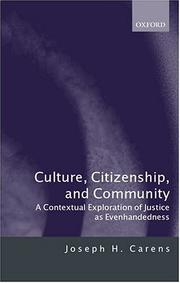| Listing 1 - 2 of 2 |
Sort by
|

ISBN: 0198297513 0198297688 0191522937 9786611989729 128198972X 9780198297680 Year: 2000 Publisher: Oxford: Oxford university press,
Abstract | Keywords | Export | Availability | Bookmark
 Loading...
Loading...Choose an application
- Reference Manager
- EndNote
- RefWorks (Direct export to RefWorks)
This text seeks to contribute to debates about multiculturalism and democratic theory. It reflects upon the ways in which claims about culture and identity are advanced by immigrants, national minorities, aboriginals and groups in different societies.
Justice. --- Multiculturalism. --- Cultural pluralism --- Democracy. --- Justice --- Multiculturalisme --- Diversité culturelle --- Démocratie --- Multiculturalism --- Democracy --- Cultural pluralism. --- Diversité culturelle --- Démocratie --- Cultural diversity policy --- Cultural pluralism policy --- Ethnic diversity policy --- Injustice --- Cultural diversity --- Diversity, Cultural --- Diversity, Religious --- Ethnic diversity --- Pluralism (Social sciences) --- Pluralism, Cultural --- Religious diversity --- Self-government --- Government policy --- Social policy --- Anti-racism --- Ethnicity --- Cultural fusion --- Conduct of life --- Law --- Common good --- Fairness --- Culture --- Political science --- Equality --- Representative government and representation --- Republics
Multi

ISBN: 1526105233 1526105225 152610525X 1526105241 Year: 2018 Publisher: Manchester, UK : Manchester University Press,
Abstract | Keywords | Export | Availability | Bookmark
 Loading...
Loading...Choose an application
- Reference Manager
- EndNote
- RefWorks (Direct export to RefWorks)
This book addresses the major theoretical and practical issues of the forms of citizenship and access to citizenship in different types of polity, and the specification and justification of rights of non-citizen immigrants as well as non-resident citizens. It also addresses the conditions under which norms governing citizenship can legitimately vary. The book discusses the principles of including all affected interests (AAI), all subject to coercion (ASC) and all citizenship stakeholders (ACS). They complement each other because they serve distinct purposes of democratic inclusion. The book proposes that democratic inclusion principles specify a relation between an individual or group that has an inclusion claim and a political community that aims to achieve democratic legitimacy for its political decisions and institutions. It contextualizes the principle of stakeholder inclusion, which provides the best answer to the question of democratic boundaries of membership, by applying it to polities of different types. The book distinguishes state, local and regional polities and argues that they differ in their membership character. It examines how a principle of stakeholder inclusion applies to polities of different types. The book illustrates the difference between consensual and automatic modes of inclusion by considering the contrast between birthright acquisition of citizenship, which is generally automatic, and naturalization, which requires an application.
Political participation. --- Representative government and representation. --- Democracy --- Social aspects. --- Bauböck, Rainer --- Criticism and interpretation. --- Self-government --- Political science --- Equality --- Representative government and representation --- Republics --- Parliamentary government --- Political representation --- Representation --- Constitutional history --- Constitutional law --- Elections --- Suffrage --- Citizen participation --- Community action --- Community involvement --- Community participation --- Involvement, Community --- Mass political behavior --- Participation, Citizen --- Participation, Community --- Participation, Political --- Political activity --- Political behavior --- Political rights --- Social participation --- Political activists --- Politics, Practical --- all affected interests --- all citizenship stakeholders --- all subject to coercion --- citizenship --- democratic inclusion --- local polities --- membership --- political community --- regional polities --- stakeholder inclusion --- state polities --- Society and social sciences. --- Political science and theory. --- PHILOSOPHY / Political. --- Law --- Jurisprudence & general issues --- Methods, theory & philosophy of law.
| Listing 1 - 2 of 2 |
Sort by
|

 Search
Search Feedback
Feedback About UniCat
About UniCat  Help
Help News
News